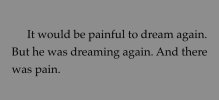Jo Bugman
Jedi Master
I'm on book 3 of Mary Balogh's Bedwyn Saga.
The first, Slightly Married, I sort of dragged through it until I could understand the main male character, Aidan's, struggle with honor and his need to be 'honor bound' not just to the main purpose (without giving spoilers) but also to life in general. The need to have our sense of honor and duty can often prevent us from doing what we WANT to do, and that living an endlessly honor bound life can stop us from actually living. I thought it was a great representation of the struggle of manhood: when do we chose what we wish to do compared to doing what we are expected to do for the family and society? But I guess that's not really just a male issue! Eve, the main female character, was a very sweet lady but represented to me the proverb "you don't have to set yourself on fire to keep others warm", as she was so focused on pleasing everyone else in her life that she forgot to plan for herself.
Slightly Wicked, the second book, was good. I thought the 'villain' of this one was very good and I was whooping when he got his comeuppance. Both of these books showed that sometimes our biggest devils in life can be our own family members, shaping our self image from a young age whether intentionally or not.
Or at least, that's what I got out of these two very tender, loving stories. Looking forward to book 3, although I am noticing a common theme that the female characters are always very quick to reject the male's proposal for marriage, usually on the basis of pride, despite their desire to say yes!! I'm not sure if this is a little dramatic gimmick in the plot line, but I'm finding that it's frustrating me. I get very upset when I see her say no, then slump off to her newfound spinster lifestyle in a woe-is-me attitude while making the poor man chase after her again. I've been turned down on marriage proposals on a few occasions so that can be where the frustration is coming from. Personally, I've adopted the mindset that if someone tells me to bugger off, then I'll bugger off regardless of whether they meant it or not. As from that point, it's the other's responsibility to let me know if they changed their mind. It seems I'm a bit more cynical than our romance heroes, I need to work on why this frustrates me.
The first, Slightly Married, I sort of dragged through it until I could understand the main male character, Aidan's, struggle with honor and his need to be 'honor bound' not just to the main purpose (without giving spoilers) but also to life in general. The need to have our sense of honor and duty can often prevent us from doing what we WANT to do, and that living an endlessly honor bound life can stop us from actually living. I thought it was a great representation of the struggle of manhood: when do we chose what we wish to do compared to doing what we are expected to do for the family and society? But I guess that's not really just a male issue! Eve, the main female character, was a very sweet lady but represented to me the proverb "you don't have to set yourself on fire to keep others warm", as she was so focused on pleasing everyone else in her life that she forgot to plan for herself.
Slightly Wicked, the second book, was good. I thought the 'villain' of this one was very good and I was whooping when he got his comeuppance. Both of these books showed that sometimes our biggest devils in life can be our own family members, shaping our self image from a young age whether intentionally or not.
Or at least, that's what I got out of these two very tender, loving stories. Looking forward to book 3, although I am noticing a common theme that the female characters are always very quick to reject the male's proposal for marriage, usually on the basis of pride, despite their desire to say yes!! I'm not sure if this is a little dramatic gimmick in the plot line, but I'm finding that it's frustrating me. I get very upset when I see her say no, then slump off to her newfound spinster lifestyle in a woe-is-me attitude while making the poor man chase after her again. I've been turned down on marriage proposals on a few occasions so that can be where the frustration is coming from. Personally, I've adopted the mindset that if someone tells me to bugger off, then I'll bugger off regardless of whether they meant it or not. As from that point, it's the other's responsibility to let me know if they changed their mind. It seems I'm a bit more cynical than our romance heroes, I need to work on why this frustrates me.

 Actually, now that I´m writing, the series really was a good one.
Actually, now that I´m writing, the series really was a good one.

